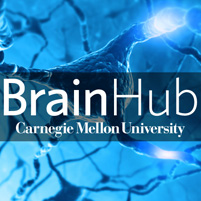CMU Launches BrainHub℠

Director of the National Institute of Mental Health Tom Insel* addressed a standing-room-only audience on the Pittsburgh campus recently as part of Carnegie Mellon University's BrainHub℠ launch.
"The world has discovered the brain. This is a hot topic, about which the public has become really intrigued," he said.
CMU BrainHub℠ is a new initiative that focuses on understanding the human brain — one of the grand challenges of the 21st century.
University President Subra Suresh welcomed Insel and members of a distinguished panel comprised of CMU faculty and research partners from the University of Warwick in the U.K., and Sun Yat-sen University (SYSU) in China. He explained why CMU is the right place for understanding how the brain works.
"CMU is home to some of the world's top scientists investigating brain function and human behavior," President Suresh said. "We also are home to the pre-eminent computer science program in the country and a world-class engineering school. By combining these areas of expertise, along with CMU's renowned talents in data sciences, the science of learning, policy and cybersecurity, we will enable innovative computational approaches to understanding brain function and dysfunction, as well as facilitate the development of tools to unravel the complexities of the human mind."
CMU scientists and their global partners including Sun Yat-sen University in Guangzhou, China; the Indian Institute of Science in Bangalore; and Oxford University and the University of Warwick, U.K., will work together, along with CMU's long-time collaborators from the University of Pittsburgh, to develop innovative computational and technological tools for studying the links between brain and behavior, enabling new insights into topics such as cognition, learning and perception, as well as shedding light on brain disorders such as autism and Parkinson's disease.
"This dynamic partnership, bringing together expertise from across CMU and global universities, government and corporate sponsors, will allow us to deepen our understanding of how the brain performs the computations that underlie the functions that we take for granted in our daily life — how we see and hear, learn, remember and move," said Nathan Urban, CMU interim provost.
CMU Professor Michael Tarr, head of Psychology, moderated the discussion.
Along with Insel, the panel included:
- Theodoros N. Arvanitis, professor of e-Health Innovation and head of research at the Institute of Digital Healthcare, WMG, at the University of Warwick
- Alison Barth, CMU professor of biological sciences
- Marlene Behrmann, the George A. and Helen Dunham Cowan Professor of Cognitive Neuroscience at CMU, and co-director of the Center for the Neural Basis of Cognition
- Dr. Mengfeng Li, vice president of SYSU, the Cheong-Kung Professor of Medicine and dean of the SYSU Zhongshan School of Medicine
- Tom Mitchell, the E. Fredkin University Professor and chair of the Machine Learning Department at CMU
Over the next five years, BrainHub and CMU's efforts in brain science will be supported by initial commitments totaling about $75 million. Leveraging funding from multiple sources — existing funding, as well as new funding and in-kind contributions from philanthropic foundations including the Hillman Foundation, R.K. Mellon Foundation and Dietrich Foundation; Kris Gopalakrishnan, (co-founder of Infosys); institutional partners; U.S. federal and local government; and internal CMU commitments from colleges and schools — CMU will focus concerted efforts on understanding the brain.
* The National Institute of Health does not endorse Carnegie Mellon University or any of its programs or services.
Related Links: Read the full press release | CMU BrainHub
